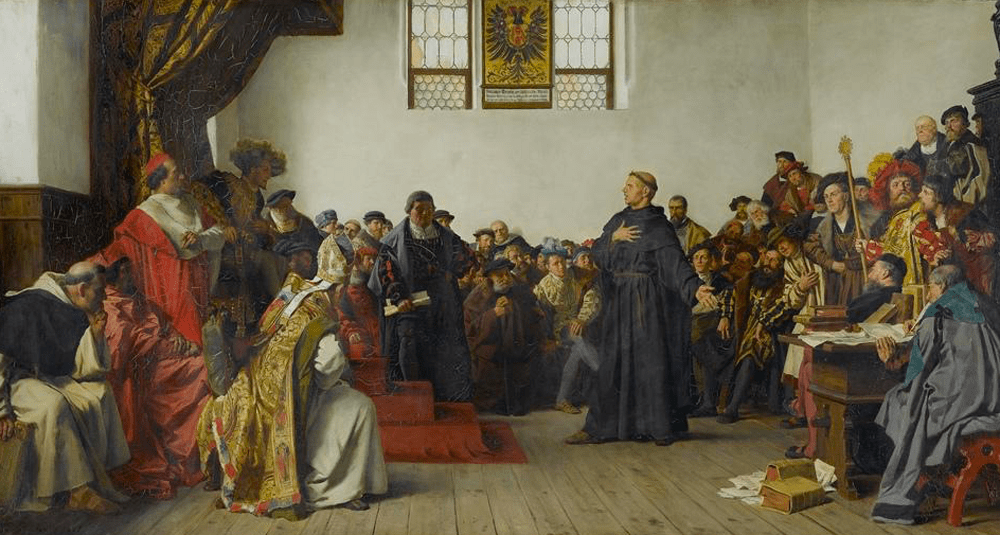To which branch of Christianity is Martin Luther the initiator?
Last Updated:
Martin Luther, born on November 10, 1483 in Eisleben, Germany, and died on February 18, 1546 in the same town, is an emblematic figure in Western religious history. Priest, theologian and university professor, he played a major role in the development of Christian theology and the Church itself.
Luther’s youth was marked by a strict upbringing. His interest in theology was soon aroused and, seeking to deepen his faith, he joined an Augustinian brotherhood. This decision forged the man he was to become, giving him the foundation he needed to challenge some of the most controversial practices of the Catholic Church of his day.
Why is Martin Luther famous?
Martin Luther is best known for the crucial role he played in the Protestant Reformation, a movement that challenged many of the practices and doctrines of the Roman Catholic Church. His crowning achievement was the publication of the 95 Theses in 1517, a document that strongly criticized the Church’s trade in indulgences.
Why did Martin Luther criticize the Church?
Luther was particularly outraged by the indulgence trade, in which the Church offered forgiveness of sins in exchange for money. In his view, this practice exploited believers and distorted the central message of Christianity. Luther also criticized the Church’s enormous accumulation of wealth and material goods, which he saw as a sign of corruption and a deviation from the teachings of Scripture.
What are Martin Luther’s main ideas?
At the heart of Luther’s teaching is the idea that salvation of the soul is a free gift from God, received solely through faith in Jesus Christ as Messiah, and not through meritorious works. It firmly holds that the Bible is the only legitimate source of Christian authority, in contrast to the established ecclesiastical tradition that places the Church and its leaders in the role of intermediaries between God and believers.
What is Lutheran doctrine?
Luther’s Lutheran doctrine radically alters certain Christian beliefs. He reduced the sacraments to two: baptism and the Eucharist, rejecting the other five recognized by the Catholic Church. Luther also denounced the veneration of images and the concept of purgatory, emphasizing a more direct and personal relationship with God. This doctrine continues to influence many Protestant churches around the world today.
The Protestant Reformation was a major religious movement that shook Europe in the 16th century, leading to a profound reorganization and fragmentation of the Roman Catholic Church. It began in 1517 with the publication of Martin Luther’s 95 theses, and spanned several decades, permanently altering Europe’s religious landscape.
What was the aim of the Protestant Reformation?
The main aim of the Reformation was to return to the sources and original form of Christianity, getting rid of practices deemed unbiblical, such as the trade in indulgences, which had become commonplace within the Roman Church. The Reformers aspired to a religion more authentically based on Scripture, faith and grace, rather than ritual and payment.
What were the causes of the Protestant Reformation?
The Protestant Reformation was largely driven by theological debates about salvation, the authority of the Church and the Scriptures. The movement was also fueled by the spread of the written word and growing literacy, thanks to the invention of the printing press, which enabled the reformers’ ideas to spread rapidly throughout Europe.
What are the three currents of Protestantism?
- Lutheranism: Founded by Martin Luther, this movement emphasizes justification by faith alone and the authority of Scripture. The sacraments of baptism and the Eucharist are also central.
- Calvinism: Initiated by John Calvin, this movement is known for its teaching on predestination and God’s absolute sovereignty in the salvation of individuals. It also adopted a Presbyterian form of ecclesiastical governance.
- Anglicanism: Created by King Henry VIII of England, Anglicanism broke away from the Roman Church mainly for political and personal reasons. Although it retained many Catholic practices, it adopted certain Protestant theologies and rejected papal authority.
What was the main consequence of the Protestant Reformation?
The Protestant Reformation profoundly transformed European societies. By challenging the authority of the Catholic Church and encouraging literacy and personal access to the Scriptures, it not only changed religious structures, but also had a major cultural, political and educational impact on the cultures under Europe’s influence.
history

To which branch of Christianity is Martin Luther the initiator?
Answer
Martin Luther is the initiator of Protestantism which gave birth to many Protestant churches and marked the history of Christianity.